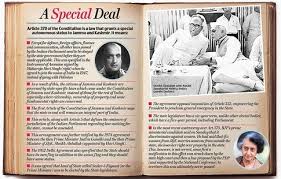If the Article is abrogated by unconstitutional means the result would be constitutional crisis
The first question to be understood by all of us is why Article 370.
 Article 370 accords Special Status to Jammu Kashmir as a federating unit of Indian union. This constitutional position and special status available to Jammu Kashmir is somewhat different from other states.
Article 370 accords Special Status to Jammu Kashmir as a federating unit of Indian union. This constitutional position and special status available to Jammu Kashmir is somewhat different from other states.
To understand as to how and why Jammu Kashmir was accords a special status or why there is different constitutional arrangement with the state of Jammu Kashmir. One has to move back the time of partition of 1947.
When the partition of India and Pakistan was under process and Sir Redcliff was invited to draw the boundaries between the two dominions, there were 562 princely states at that time. These princely states were given the option to either join dominion of India or Pakistan or have a standstill agreement with both of them.
Some states join India and some joined Pakistan. All these states that joined either of them were required not only to execute the instrument of accession but also the instrument of merger.
The position of the state of Jammu Kashmir was different at that time and the state made a standstill agreement with both the dominion of India and Pakistan. As alleged that the standstill agreement was violated by Pakistan which ultimately lead the instrument of accession with dominion of India.
Here, we need to note that the accession was partly provisional. For example, clause 7 of this instrument read that Maharaja was not committed to accept the future constitution of India.
Similarly, clause 8 said that nothing in the instrument affected the sovereignty of the Kashmir.
The subjects that were surrendered to India included Defense, External Affairs, Communications and some ancillary subjects in these three matters. With respect to other matters the state of Jammu Kashmir retained the powers and union of India was having no power to legislate on these other matters.
This instrument of accession was different from those executed by rest of the states in Indian dominion as it conferred on the state of Jammu Kashmir an autonomous status.
Thereafter in order to move away from the instrument of accession Article 370 was incorporated in the Indian constitution as to govern the relationship between India and the state of Jammu Kashmir.
Article of 370 was sanctified from time to time to assert that the relationship of Jammu Kashmir with Government of India is governed by Article 370 as is witnessed by the Delhi Agreement of 1952, then we have the Constituent Assembly of Jammu Kashmir which also approved Article 370 and thereby making it a permanent provision of the constitution of India not withstanding the head note of the said article.
Government of Jammu Kashmir and Government of India moved ahead by way of Sheikh-Indira Accord of 1975 which again resolved that the relationship between the two would be governed by Article 370 of the Indian constitution.
This was further made clear by the Jammu Kashmir High Court that Article 370 has achieved the position of permanence in the constitution of India. So to argue for abrogating Article 370 is preposterous.
Erosion of Article 370
The second question to be analysed is whether Article 370 has retained its original position. The answer to this question is a big no, as 47 orders have been made applicable to Jammu Kashmir from 1956 to 1994.
Similarly, out of the 97 union subjects 94 have been made applicable to Jammu Kashmir.
This clearly shows that Article 370 has been eroded from time to time and made a hollow provision which I think is not only the violation of the constitution of India but is a big fraud committed on the Constitution of Jammu Kashmir.
Thus the autonomy as envisaged by Article 370 has been eroded substantially. The need of the hour is to debate and discussion with in the socio-legal experts as to how the autonomy as envisaged by originally incorporated Article 370 can be restored rather than discussing abrogation of article 370 which is a myth and beyond reality.
Importance of Article 370
Coming on the another issue that is the statement made by honorable Prime Minister of India Narendra Modi whether Article 370 has done any good to Jammu Kashmir, the answer is yes, as pointed out by former Vice Chancellor of University of Kashmir professor Reyaz Ahmad Punjabi that the agrarian reforms could not have been possible without Article 370 under which land was allotted to the tiller.
Another important benefit of Article 370 to the people of Jammu Kashmir has been the land given to them free of cost under Roshni Act of 2002, which I think has become possible only by the blessings of Article 370.
Another important good which Article 370 has done to the state is in the form of relief given to the educated youth of the state.
Presently most of the educated youth in Jammu Kashmir are unemployed and one can imagine what would have been the fate of educated unemployed youth of Jammu Kashmir if protection by Article 370 would have not been given to them.
It is by virtue of Article 370 that makes it possible that outsiders cannot and only the educated youth of Jammu Kashmir can apply in the matters of employment here.
Another important benefit of Article 370 as pointed out by the former Vice Chancellor of University of Jammu professor Amitabh Mattoo said, “Article 370 was and is about providing space, in matters of governance, to the people of a State who felt deeply vulnerable about their identity and insecure about the future. It was about empowering people, making people feel that they belong, and about increasing the accountability of public institutions and services.”
Is Article 370 a barrier to development?
One of the strong argument of the people who are for the abrogation of Article 370 is that this article is a barrier for the development of Jammu Kashmir but there is no single instance or any proved fact to show that this article has become a barrier in the developmental works of the state even if taken by the central agencies.
Developmental works for the state can be taken without any restriction as is clear through the construction of railway four lane roads, central universities etc. Therefore to say that this Article is a barrier is preposterous.
Further acquiring land for developmental projects has nothing to do with Article 370 as land can be transferred to such projects as is clear from section 140 of the transfer of Property Act.
Abrogation of Article 370 and its consequences
Coming on the main issue whether Article 370 can be abrogated or not. The answer is provided in the very article under clause (3) of said Article which says, “President may by public notification declare that this Article shall cease to operate from such date as he may specify.” But condition precedent for exercising such power is that the Constituent Assembly must recommend for its abolition.
Since Constituent Assembly was in operation from 1952-1957, but they have not shown any way to Article 370, which clearly means that they allowed Jammu Kashmir to be governed by the said article.
Since the Jammu Kashmir Constituent Assembly has ceased to operate, it becomes quite clear that the powers of President to make any notification for abrogation also ceased as president cannot make any such order without the condition precedent being fulfilled.
Further, Supreme Court of India in I.R. Coelho V/S State of Tamil Nadu AIR 2007 SC861 declared that the powers of a constituent assembly and the parliament which is the creation of constituent assembly are not equal.
It clearly means that the power of Constituent Assembly can never be exercised by the state assembly as the same is not constitutionally competent.
Further, if we analyze section 147 of the Jammu Kashmir Constitution it becomes crystal clear that even though the state assembly has a will to go for such extra ordinary measure it can ever do so as section 147 cleary says that no amendment can be made to section 147, section 3 and 5 or to the provisions of the constitution of India as applicable to the state of Jammu and Kashmir, therefore Article 370 is one of such provision of the constitution of India applicable to the state which cannot be amended.
Thus section 147 kept all speculation at rest by closing the further discussion on the abrogation of the Article 370.
Consequences
It is clear that Article 370 has assumed a place of permanence in the constitution of India and there is no need to abrogate it. It cannot be abrogated as all the routes leading to the abrogation of said article have ceased to operate since 1957 with the death of the Jammu Kashmir Constituent Assembly.
If article 370 is abrogated through illegal and unconstitutional means the result would be constitutional crisis and international embarrassment for the Government of India.
Further the relationship of Jammu Kashmir with rest of India would be reverted back to the position that was in 1947 and Jammu Kashmir would be a sovereign state as is clear from clause 8 of Instrument of Accession which says, “Nothing in the instrument affected the sovereignty of the Kashmir.”
Thus the result of abrogating Article 370 would be a sovereign state of Jammu Kashmir.
Further abrogating Article 370 is not the way that the dispute with Pakistan over Jammu Kashmir will come to an end rather it would escalate the situation and the matter would fall in the lap of the International Court of Justice.
Author has Masters in Law from Kashmir University and can be mailed at waniahmadmashooq@gmail.com





